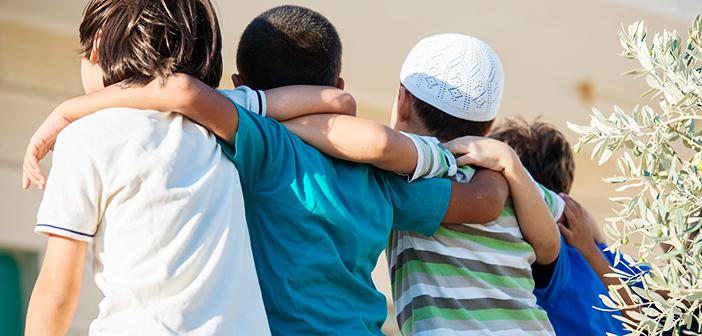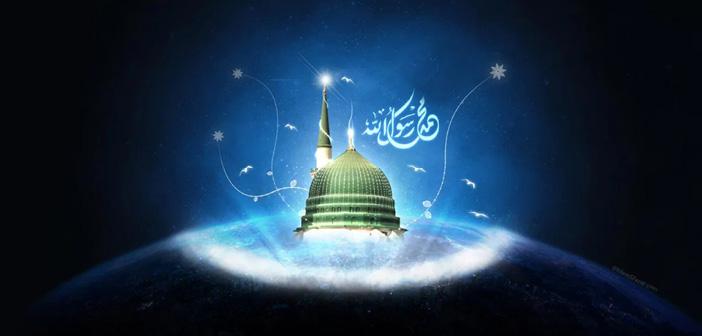What are the manners of brotherhood in islam? What is unity and brotherhood in islam?
People who lived in tribes before Islam were constantly at war. Wars waged out of little pretexts were fought for the honor of the tribe. The bond of kinship preceded the bond of religion and belief. After the advent of Islam, religious brotherhood took precedence over everything else. In line with the Divine command “The Believers are but a single Brotherhood: So make peace and reconciliation between your two (contending) brothers; and fear Allah, that you may receive Mercy.” (al-Hujurat, 49: 10) the Blessed Prophet -upon him blessings and peace- declared a brotherhood amongst the believers. After that, the feeling of religious brotherhood took precedence over kinship bonds. So much so that in the Battle of Badr, which was the first battle of the Muslims, some Muslims fought with their brothers, some with their fathers, and some with their uncles. As a matter of fact, on that day, Abu Bakr -May Allah be well-pleased with him- came face to face with his son; and Abu Ubayda ibn Jarrah -May Allah be well-pleased with him- against his father; and Hamza -May Allah be well-pleased with him- against his own brother.
After the Migration to Medina, the Ansar from Medina became such brothers with the Muhajirs from Mecca that they made them partners in their own house. They gave half of their garden and fields. They showed an unprecedented example of sacrifice and generosity.
Our brother deserves the best of our service and care
The Blessed Prophet -upon him blessings and peace- offered the following advice to a group of Companions, just before they set out to visit another group of brethren:
“You are coming to your brethren; so tidy your mounts and tidy your dress, until you are like a mole among the people. Allah does not like obscene words or deeds, or do intentional committing of obscenity.” (Abu Dawud, Libas, 70)
Brothers are responsible towards one another! Brothers have rights over each other!
A brother runs to his brother’s help, sees to his need; for whosoever takes care of a brother’s need in this life will have Allah, glory unto Him, take care of his need in the Hereafter. (Bukhari, Mazalim, 3)
A brother does not expose the faults of his fellow brother. Whosoever conceals the deficiencies of a brother in this life, Allah, glory unto Him, will conceal his faults in the Hereafter. (Muslim, Birr, 58)
Muslims seek to patch up relations, not destroy them. They do not backbite and spread gossip.
Believers visit each other only for the sake of Allah, glory unto Him, in good times and bad.
Muslim brothers always nurture well-wishes for each other.
They express their love for another.
If a believer must tell another of his mistake, he talks to his brother with the best of intentions and in private. He acts like a mirror that reflects to him what he is.
A brother also loves and respects his brother’s loved ones.
Brothers never hate or do not envy or hold grudges against each other. Thus they do not stay offended for more than three days.
Brothers do not look down on each other.
A brother prays for his fellow brothers who have become entrapped in the swamp of sin. He tries to save them and give them a helping hand out of their situation.
In showing mutual mercy and compassion towards one another, Muslims are like the organs of a single body. When one of the organs hurt, it distresses the rest of the body. For instance, during a toothache, we instantly raise our hand to our cheek for comfort. Our feet carry the whole body to the dentist, just to have the aching tooth treated. The eyes share its pain by losing sleep and staying awake. The entire body mobilizes itself to heal the pain of a single tooth. And likewise, no matter how geographically distant they may be from each other, all Muslims are like the organs of a single body.
Hasan Basri -may Allah have mercy on him- once had a man come to him and say,
“I went to so-and-so’s house the other day and he said malicious things about you.”
“Why did you go to his house to begin with?” asked Hasan Basri.
“I was invited there for a meal”, he replied.
“Well, what did he serve you?”
“Many things…Soup, roast meat, sweets, milk…”
In response, Hasan Basri said:
“You were able to keep all those things you ate in your stomach and you could not keep a couple of words to yourself?”
A LEGENDARY FEAT (A STORY)
The Battle of Yarmuk was a fierce battle that tested the patience of all Companions. There were only 46,000 of them, facing a daunting Byzantine army of 240,000 men. Muslim soldiers whose hearts filled with the love of Allah and His Messenger, fought gallantly. Under the command of Khalid ibn Walid, praised by the Blessed Prophet -upon him blessings and peace- himself, they gained a blitzing victory. They had given 3000 martyrs and slain around a 100,000 Byzantines. The victory was indeed a legendary feat of bravery and sacrifice almost unequalled in history.
The battle was drawing to an end. The entire battlefield, scorched all day by the blistering sun, was covered by hurling dust. Having now fought for hours on end, the brave Muslims were carrying spear, arrow and sword wounds. They had not found even a moment’s opportunity to drink the sun-warmed water out of their water bottles. Lips craving for a drop of water were, one by one, sipping the potion of martyrdom that would cool them down for eternity, mumbling the word of tawhid with their parched tongues. Huzayfa -May Allah be well-pleased with him- recounts these scenes of sacrifice made by men giving up their loves for the sake of Allah, glory unto Him, and the eternal happiness of humankind:
“I was wounded and exhausted. With what remained of my strength, I got up on my feet and went looking for my cousin Harith. I was moving amid my brothers, laying across the field, living their final moments in life, moaning from the pain of their mortal wounds. Before long, I found him. He was carrying multiple wounds. I kneeled towards him, with my water bottle in hand.
He had no energy left to speak. However, he was trying to tell me something with his eyes. When I hurriedly opened the lid of the bottle and held it out to him, to unite his cracked lips with the water he had been longing for, I heard the voice of brother Iqrimah, lying wounded on the ground close to where we were.
‘Water! Water! Please…a drop of water” he was moaning. It turns out that on hearing the voice of Iqrimah, my cousin was signaling me, with his eyes, to take the water bottle to him instead.
I immediately ran towards Iqrimah, who had let go of his body, pierced by from multiple sword and spear wounds, on the scorching sand. I held out my bottle to his mouth. He seized it and lunged forward to take his first drink. That was when we heard the moans of our brother Ilyas, from not so far away.
A drop of water, please…For the love of Allah!’ he was groaning.
Before the warm water could even touch his lips, Iqrimah handed the bottle back to me; and slowly turned his head towards the direction of Ilyas, signaling me to take the bottle to him. He could not bear to have even a drop of water his brother Ilyas was agonizingly moaning for.
When I ran to Ilyas, I found him drawing his last breath, saying the word of tawhid. His Lord had taken Ilyas to His eternal mercy, allowing him to gulp the springs of Paradise before he could ever lay his parched lips on the water Iqrimah had foregone for him. Instantly, I ran back to Iqrimah, thinking that I should at least deliver the water to him. But by the time I arrived next to him, he too had long drunken the beverages of Paradise offered to martyrs. Harith was still alive, at least; so I ran this time to him. But like the others, Harith stood in no need of water anymore.
Source; Islamic Etiquette, Faruk KANGER – Lokman HELVACI, Erkam Publications
Good Manners Towards Allah Almighty
Good Manners Towards Our Prophet




